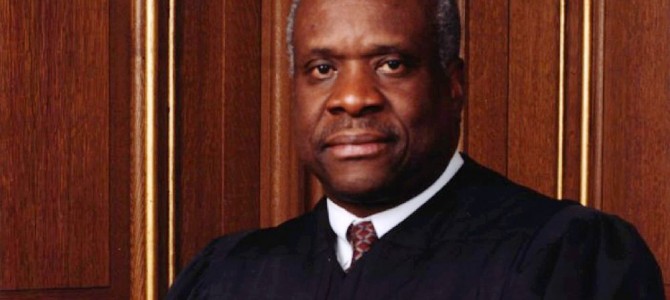
The #MeToo movement shows no sign of slowing its glacial roll of accusations of sexual misconduct against men in positions of power across American society, despite growing unease and cautionary words from some critics. The most recent man firmly positioned in the front lines of this trial by media is Clarence Thomas, whose accusers are now calling for his impeachment.
The prominent media stories of women who want Thomas removed from the Supreme Court and disciplined are filled with details and emotions, but they lack proper attention to the right of due process in our nation. Due process isn’t some arcane legal doctrine, inaccessible to all but the most well versed lawyers and legal scholars. Due process is a basic legal premise for all Americans meant to ensure that every citizen receives fair treatment in the judicial process.
Only one right is specifically detailed twice in the Constitution, and that is the right to due process, which appears first in the Fifth Amendment, where people can not be: “deprived of life, liberty or property without due process of law,” and again in the Fourteenth Amendment, where the “Due Process Clause” includes those exact same words.
Any attempt to impose harsh consequences on people without legal process passively erodes the due process right enshrined in the Constitution, and Americans should take notice and defend their right. Emotionally, it may seem fair or even just when people with lots of seemingly credible accusations against them lose their jobs or livelihoods, but there’s more at stake than one person’s job or a personal sense of justice here.
All of this circles back to the current climate around accusations, and how and where they should be made, when a well placed narrative story can ruin a reputation as soon as it goes viral. It’s in this culture that these accusations have resurfaced against Thomas, and the publications running them know they’ll shape the national conversation and the legacies of all involved.
None of this is to say that the women involved should be silenced, or that speaking out against abuse is the wrong thing to do. The opposite is true. If misconduct has occurred, it does need to see the light of the day and be investigated. But it needs to be investigated properly, and if there’s evidence, tried in a court of law. This should not be a radical idea, because ultimately this process most fully protects all of us.
Thomas’s fellow Justice Ruth Bader Ginsburg recently weighed in on the #MeToo movement, and on the repercussions of allowing it to run unchecked. Yes, accusations need to be heard, but there is a system in place for that. We do have a legal process in place to deal with both sexual harassment and perjury, because as a nation of laws we recognize that some wrongs against other people constitute a crime.
We also have another legal principle at play here, though, and that’s the statute of limitations. Both perjury and sexual harassment have varying statutes of limitations, but for allegations stretching back to the early 90s, the time limits have run out and then some. This means that the accusers can’t take their accusations to court, and have a judge and jury decide the merits of their evidence and claims. It also means that the accused has no way to clear their name, because they can never be found innocent in court.
National Review has a five part series that examines each of the allegations against Thomas and considers the legal issues behind the claims in detail, available here. A review of these claims show they’re full of discrepancies and inconsistencies, and when reputable sites run them without acknowledging this it should damage their credibility. Mark Paoletta, a D.C. lawyer, explained some of the issues with Anita Hill’s storyline. She was the only woman to testify under oath against Thomas.
Paoletta wrote:
The U.S. Senate voted to confirm Thomas because Hill’s story did not add up, and her testimony in front of the committee was riddled with lies. Try as she might, she could not explain away her decision to follow Thomas to another job after he had allegedly harassed her, or her repeated phone calls to Thomas over the years after she left government employment.”
Her “corroborating witness,” Susan Hoerchner, found herself in the same boat, repeatedly backtracking on her testimony. Hoerchner told the committee staff, for example, that she was sure the harassment occurred in the spring or summer of 1981 before she left Washington, but Hill had not even begun working for Thomas at that time.
Mollie Hemingway pointed out the incredibly troubling double standard Hill espoused in regards to Bill Clinton’s sexual misconduct in office:
For President Clinton, he’s going to suffer a disadvantage because it is now that these allegations are coming out, during his presidency. But I think what Ms. Steinem also says is we have to look at the totality of the presidency and how has he been on women’s issues generally? Is he our best bet, notwithstanding some behavior that we might dislike? I don’t think that most women have come to the point where we’ve said, “Well this is so bad that even if he is better on the bigger issues, we can’t have him as president.”
There’s an informative Federalist radio hour on this, as well, also featuring Paoletta, where he discusses his time as a lawyer in President George H.W. Bush’s White House during Thomas’s confirmation hearings. Since he was present during the proceedings, Paoletta’s perspective is a valuable one, and the information he has about the key players is useful for clearing up the motivations and behind the scenes maneuvering that happened politically at that time.
Further claims from this time period can be fact-checked here. It appears that Hill herself committed perjury during the confirmation hearings. Carrie Severino writes in National Review:
Senator Arlen Specter asked Hill about a report that she had been told offering an affidavit alleging harassment would induce Thomas to withdraw his nomination ‘quietly and behind the scenes.’ When Hill denied any memory of this conversation, Chairman Joe Biden called a lunch recess and suggested her lawyers should speak with her, knowing, as he later told Senator Specter, that she was lying. After lunch, her story changed and she remembered ‘some indication’ that Thomas ‘might not want to continue the process’ if she made charges. …
Hill claimed not to have continued contacting Thomas after leaving EEOC, but then later recanted when faced with telephone logs showing eleven such calls over eight years. Senator Specter called this testimony ‘flat-out perjury.’
David Brock wrote a lengthy rebuttal to the book about Thomas’s confirmation hearings by the same woman who wrote some of these columns. Here is part of his criticism:
Mayer and Abramson have made these accusations on the basis of accounts from sources who tell me they were either flatly misquoted or misrepresented, or refused to confirm information attributed to them. The list of these people who say they were misquoted includes the only woman whose allegations against Thomas have not been previously reported — and refuted — in prior books or articles. In addition to relying on fake evidence, doctored quotes, and unsupported hearsay, the book is brimming with anonymous and discreditable sources. Key figures were never interviewed. Where evidence does not fit the authors’ point, it is ignored entirely. And a whole array of alleged facts — small and large — are simply wrong.
Clarence Thomas has been a dedicated member of the Supreme Court for almost 27 years, and without a conviction or proof of wrongdoing, this should not be his legacy. Americans need to protect their constitutional rights, because those rights in turn protect important freedoms for all Americans.









